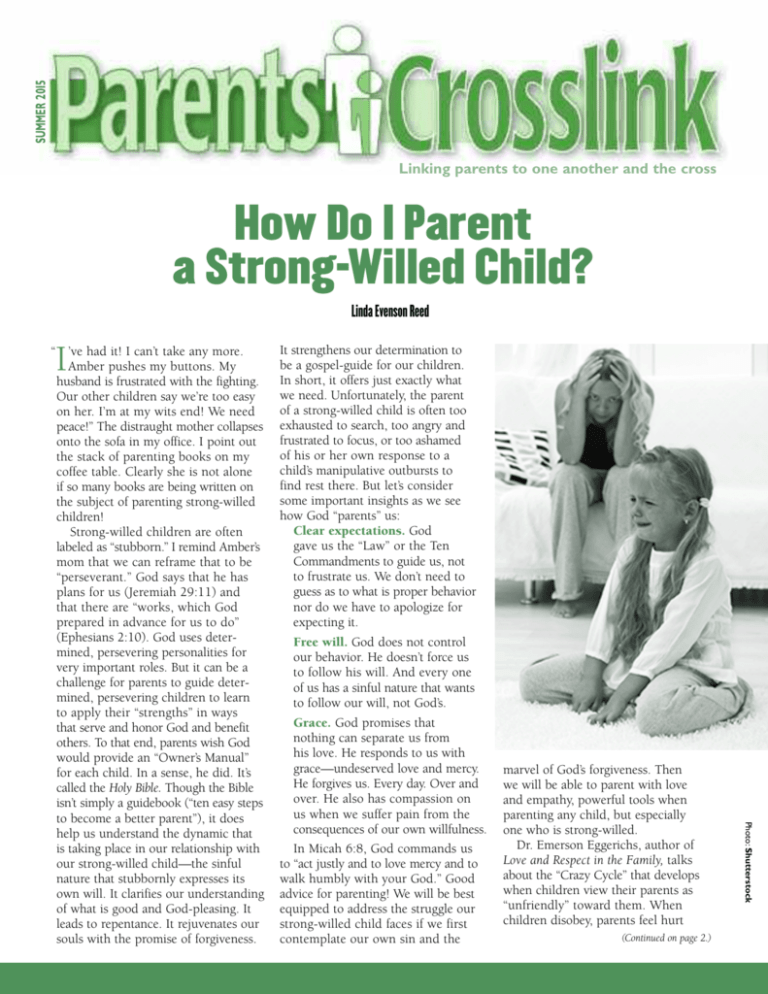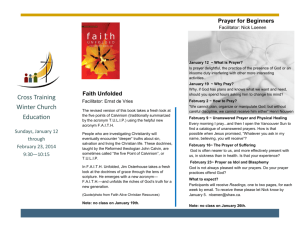
SUMMER 2015
Linking parents to one another and the cross
How Do I Parent
a Strong-Willed Child?
Linda Evenson Reed
I
It strengthens our determination to
be a gospel-guide for our children.
In short, it offers just exactly what
we need. Unfortunately, the parent
of a strong-willed child is often too
exhausted to search, too angry and
frustrated to focus, or too ashamed
of his or her own response to a
child’s manipulative outbursts to
find rest there. But let’s consider
some important insights as we see
how God “parents” us:
Clear expectations. God
gave us the “Law” or the Ten
Commandments to guide us, not
to frustrate us. We don’t need to
guess as to what is proper behavior
nor do we have to apologize for
expecting it.
Free will. God does not control
our behavior. He doesn’t force us
to follow his will. And every one
of us has a sinful nature that wants
to follow our will, not God’s.
Grace. God promises that
nothing can separate us from
his love. He responds to us with
grace—undeserved love and mercy.
He forgives us. Every day. Over and
over. He also has compassion on
us when we suffer pain from the
consequences of our own willfulness.
In Micah 6:8, God commands us
to “act justly and to love mercy and to
walk humbly with your God.” Good
advice for parenting! We will be best
equipped to address the struggle our
strong-willed child faces if we first
contemplate our own sin and the
marvel of God’s forgiveness. Then
we will be able to parent with love
and empathy, powerful tools when
parenting any child, but especially
one who is strong-willed.
Dr. Emerson Eggerichs, author of
Love and Respect in the Family, talks
about the “Crazy Cycle” that develops
when children view their parents as
“unfriendly” toward them. When
children disobey, parents feel hurt
(Continued on page 2.)
Photo: Shutterstock
“ ’ve had it! I can’t take any more.
Amber pushes my buttons. My
husband is frustrated with the fighting.
Our other children say we’re too easy
on her. I’m at my wits end! We need
peace!” The distraught mother collapses
onto the sofa in my office. I point out
the stack of parenting books on my
coffee table. Clearly she is not alone
if so many books are being written on
the subject of parenting strong-willed
children!
Strong-willed children are often
labeled as “stubborn.” I remind Amber’s
mom that we can reframe that to be
“perseverant.” God says that he has
plans for us (Jeremiah 29:11) and
that there are “works, which God
prepared in advance for us to do”
(Ephesians 2:10). God uses determined, persevering personalities for
very important roles. But it can be a
challenge for parents to guide determined, persevering children to learn
to apply their “strengths” in ways
that serve and honor God and benefit
others. To that end, parents wish God
would provide an “Owner’s Manual”
for each child. In a sense, he did. It’s
called the Holy Bible. Though the Bible
isn’t simply a guidebook (“ten easy steps
to become a better parent”), it does
help us understand the dynamic that
is taking place in our relationship with
our strong-willed child—the sinful
nature that stubbornly expresses its
own will. It clarifies our understanding
of what is good and God-pleasing. It
leads to repentance. It rejuvenates our
souls with the promise of forgiveness.
2
(How Do I Parent a Strong-Willed Child? . . . cont.)
and disrespected. The instinct is to
lash out at the child. Children want
to feel respected as much as we do. A
strong-willed child will often demand
respect from others, even if it is undeserved. If parents can disengage and
communicate empathy, it can be a
powerful tool in helping children feel
loved and motivating them to respond
with respect.
Amber’s parents told her she could
only use her new tablet at the desk.
She disobeyed and someone stepped
on it. Instead of accepting this mishap
as the consequence of her disobedience, she had a tantrum and blamed
her brother.
Empathy does not mean giving in.
Amber’s parents did not buy her a new
tablet. They told her they were sorry
that her tablet broke and that they
understood it was difficult for her to
be without it. It may not have made
Amber feel better, but it shortened
the tantrum and avoided the drama
that would have ensued if they had
lectured her.
Natural consequences. When we
sin, God often allows us to experience painful consequences. He uses
natural consequences to teach us.
For example, we betray a confidence
and we lose a friend or we overeat
and we suffer health problems.
Parenting a strong-willed child
takes time and patience. As parents
we make a mistake if we give in to our
children’s pleas to shield them from
the consequences of their actions.
Like so many of us, Amber will
need a few more “life lessons.”
About a week after the mishap,
Amber did acknowledge that she
had made a mistake. Her parents
then worked with her on a plan to
earn money to replace her tablet.
Personal responsibility. Avoid
power struggles. Shift the burden
of responsibility to the child. You
cannot make him or her do anything, but you can control the consequences. Calmly show your child
that the consequences are the result
of his or her choices and actions.
Amber’s parents were tired of fighting with her about picking up her
things. They told her that anything left
in common living areas at the end of
the day would “disappear” until the
following week. Amber complained
for the first few weeks. Her parents
consistently empathized and told her
they knew she was a smart girl and
would eventually begin to make good
choices. In time, she became more
responsible, especially when her
favorite boots were gone for a week!
Understanding. In Psalm 139 the
psalmist wrote, “O LORD, you have
searched me and you know me” (v.1).
Unlike God, we are not omniscient.
However, understanding your child’s
temperament will be a big help in
knowing how to parent. Some of
You cannot
make him or her
do anything,
but you can
control the
consequences.
us are born more persistent or
less flexible or more sensitive to
external stimuli. Each of us is “fearfully and wonderfully made” (v.14).
Remember that. Some children
develop emotional and mental
capabilities earlier or later than
others. Be sure your expectations
are realistic for your child. What
motivates your child? Some children
may be motivated by approval, by
attention, or power. Your job is to
bring your child to the Savior, not
to try to change your child’s temperament so he or she will be more like
your “ideal.”
Talk less and listen more.
“Everyone should be quick to listen,
slow to speak and slow to become
angry, for man’s anger does not bring
about the righteous life that God
desires” (James 1:19,20). Too much
“talking” sometimes exasperates
both parent and child. When the
heart rate goes up, your child gets
“flooded.” At other times, your
child will have a short attention
span and tune you out.
In his book, The Explosive Child,
Dr. Ross Greene suggests trying to
define the problem from the child’s
perspective first, then present your
perspective, and finally issue an invitation to find a solution that works
for both. Older children sometimes
come up with workable compromises.
They feel respected and enjoy the
challenge of using newly formulated
problem-solving abilities.
Do not be anxious. “Rejoice in
the Lord always. I will say it again:
Rejoice! Let your gentleness be
evident to all. The Lord is near.
Do not be anxious about anything,
but in everything, by prayer and
petition, with thanksgiving, present
your requests to God. And the
peace of God, which transcends
all understanding, will guard your
hearts and your minds in Christ
Jesus” (Philippians 4:4-7). Rejoice
in God’s promises. Receive his
peace. Look forward to seeing
how he uses your child’s strong
will for his kingdom!
(The situations presented in this
article are real; the name of the client
is not.)
Suggested Reading:
Cline, Foster, and Jim Fay. Parenting
With Love and Logic. Colorado Springs:
NavPress, 2006.
Eggerichs, Dr. Emerson. Love and Respect
in the Family. Nashville: W Publishing
Group, 2013.
Greene, Dr. Ross W. The Explosive Child.
New York: Harper Press, 2010.
MacKenzie, Robert J. Setting Limits With
Your Strong-Willed Child. New York:
Three Rivers Press, 2013.
Linda Evenson Reed has practiced as a psychotherapist in the Milwaukee area for 30 years. She
specializes in Christian counseling and marriage
and family therapy, working with individuals,
couples, and families. She currently practices
at Cornerstone Counseling in Brookfield, WI.
Linda lives in New Berlin, WI, with her husband,
Dr. Donald Reed, and is a member of St. James
Lutheran Church in Milwaukee.
3
1. Bible
2. praying
hands
3. church
4. CD with the word
Jesus on it
5. musical notes
6. bracelet with
a cross
7. religious
story book
8. heart
9. T-shirt with the
“fish” symbol
10. The letters VBS
Illustration: Len Ebert
Find the 10 hidden objects in the picture. When you’re finished, you can color the picture. The answer key is on the back page.
4
t’s called the social dimension of
I intelligence. It is what God wired
into the human brain that makes us
want to connect with other human
beings. In Eden, God had Adam
conduct the animal-naming experiment so Adam would understand
that a conversation with a crocodile
or a repartee with a rhino could only
go so far. Adam was not complete
until he found a helper, a mate, a
friend like Eve. When sin entered
Eden, however, the perfect-friend
factor was toxically infected, just
like everything else. Now, “friends,”
especially the ones hanging out with
our children, can sometimes be a
real cause for concern.
For most parents, the real fears
about their children’s friends kicks
in when the children reach adolescence and the peer group becomes
more important. It’s normal for our
adolescent children to want to break
away. The “journey to independence”
requires that adolescents find out
who they are as individuals. At some
point in the development of these
divinely designed social beings—our
children—something triggers a switch.
They begin to think, “I have to start
breaking away from my family of
origin. I have to start becoming my
own person. I need to find out who I
am and learn better what my purpose
in life is.”
The journey to independence,
however, is confusing and scary for
our children. They want to boldly
blast into the adult world, but at times
still need to retreat to the security
blanket of childhood. Adolescents do
not recognize the dynamics at work,
but they definitely grasp the fact that
the surest way to halt the journey to
independence is to grow up to be
exactly like their parents.
Fortunately for our children, plenty
of their peers are going through the
same thing. The peer group and the
individual friends our children chum,
or slum, with become—for a while—a
second family within which our children
find support and with whom they can
test the values they have learned at
home and church. Eventually, and
thankfully, our children grow out of
adolescence, and the power of the peer
group weakens. Our children then
tighten the link with their family of
origin with a much better sense of who
they are and what’s really important.
But how do you hold yourself
together while it is playing out? What
are your options if some of the peers
your independence-craving kid hangs
out with are freaking you out? The
following bits of advice—while not
exhaustive by any means—should
be helpful.
LIGHTEN UP
A LITTLE.
If you have an overall positive
relationship with your child, and have
nurtured Christian values in your
home, the peers will not irreparably
damage your darling. Trust your child
a little. Give him or her some credit
for having learned some good things
from you. You absolutely want to stay
actively engaged in your child’s life,
and you need to continue to pray, but
you must also trust that God will help
your child successfully navigate these
new waters. Express this confidence
to your child often.
If you have not instilled Christian
values in your child, you will be in for a
bumpier ride and will need to do some
Illustration: Shutterstock
Don’t Be
Freaked OUT
By Your Child’s Friends
Joel A. Nelson
5
major catching up. What makes parentadolescent relationships so tough sometimes is the all-of-a-sudden interest a
parent starts taking, when up to that
point, there was marginal moral modeling. In adolescence, youthful antennae
go on high alert to detect inconsistency
or hypocrisy in adults. If you find yourself in this boat, seek some spiritual and
practical advice from a trusted source
who understands this life phase.
FACILITATE MORE
FAMILIARITY.
Before you pass judgment on your
child’s choices in friends, get to know
them, especially on the inside. Piercings,
tattoos, Gothic garb, designer dress,
Goodwill bargains, a flair for the artistic
or athletic, brash or shy behavior, spellbinding elocution, or monosyllabic
grunting—all are externals that can
irritate and annoy but usually do not
define what the friends are really like.
Immediately second-guessing your
child’s relational choices sends the
message that he or she can’t handle
growing up. It may also produce
the opposite response—it may drive
your child to these friends even more.
If you are really struggling, think of
the people Jesus hung around with in
order to win them for the kingdom—
certainly not the “beautiful people”
of Palestine.
Also, remember that adolescence
is the “try on” years. Almost all
adolescents will experiment with
different speech, dress, diet, and
relationships to find out who they
really are. Expressing a sincere, Christlike interest in your child’s choices for
friends will enhance the developmental
partnership you have with your child.
Invite the friends over to your house
and ask your child to introduce them
to you at school events or church. Your
child may push back on this a bit,
thinking that you are a loser who will
totally destroy his or her standing in
the social network. The reality, though,
is that your child’s friends will think
you are really cool compared to their
“loser” parents.
It is also wise to get to know your
child’s friends’ loser parents as well.
The more partners you have as you
help your child successfully navigate
the journey to independence, the
better. Here again, if you have treated
your child with Christ-like love and
respect before the “try on” years, your
child will show love and respect for
you and to you when the peer meetand-greets happen.
RECALIBRATE
YOUR ROLE.
Did you know that parents are
frequently the ones causing the problems during the adolescent life stage?
Many parents do not grasp that their
role must transition from being
“Loving Law-Givers” to becoming
“Approachable Advisors.”
When our children are smaller
and in what’s called the concrete
operational stage, we can tell them
to do things and they do not push
back much. They believe we are the
experts who know what we are doing.
When kids hit adolescence and are
able to think abstractly, continuing to
dictate what they should think, feel, or
do—or who their companions should
is not easy, but it does model and
witness for them a Christlike, adult
way to deal with life.
TALK, TALK, TALK
ABOUT TRUST.
Adolescents want independence.
We parents will want to keep giving
them more “leash” as long as they
can prove worthy and maintain our
trust. Emphasize in loving ways, over
and over and over, that the trust that
exists between you and your child is
sacred. You have to be able to trust
your child with his or her choice of
friends because, more and more, they
are going to be out of your sight and
experiencing more of the adult world.
Maintaining a high level of trust
(something you want) will result in
increased freedom (something your
child wants). Trampled trust is very,
very hard to repair, but honest, godly
obedience will bring great blessings.
Adolescence along with the opportunities and challenges it brings to you
and your child relative to peers, friends,
The journey to
independence, however,
is confusing and scary
for our children.
be—sends a message that you have no
confidence in their ability to correctly
figure it out themselves.
We also have to understand that
the God-designed, human brain is
incomplete until people reach their
mid 20s. The adolescent brain,
especially the part that controls
decision-making and emotion—big
factors when finding friends—is not
fully wired. So, parents need to listen
more and talk less, patiently counsel
through dicey issues, dispassionately
advise, and help their children to
weigh the options and outcomes
relative to social connections. This
and relationships is really one of the
most wonderful life experiences there is.
Embrace it. Remain positive. Remember
that you were this way once. Stay
grounded in God’s Word, and use this
period to teach your child about God’s
wonderful design for Christian adults.
Finally, don’t freak out. The greatest
thing about this life phase is that your
kid grows out of it!
Dr. Joel Nelson has served as a teacher, school
principal, staff minister, and director of the
synod’s Youth Discipleship division. He has
recently started a consulting firm called
Creating Youthful Churches.
6
The Crown
CONNECTION
“Far away in northwestern Montana,
hidden from view by clustering
mountain peaks, lies an unmapped
corner—the Crown of the Continent.”
—George Bird Grinnell
hese words, written in 1901,
T
describe the land we know as
Glacier National Park. Because my
Photo: Shutterstock
family lives in Montana, we frequently
see newspaper headlines about the
disappearing glaciers in Glacier National
Park. The big question is will Glacier
National Park continue to be the
“Crown of the Continent” if the
namesake glaciers are gone?
Our Lord made man the crown of
his creation. Are we worthy of such
a title? How are we doing? As God’s
family of believers, is our faith shrinking like the glaciers? Will we retain
our title of “Crown of God’s Creation”
even though we constantly do things
against God’s will?
A children’s book called Princess
Pigsty tells the story of a little princess
who is so spoiled that she rebels against
being a princess. She throws her crown
into the fishpond and refuses to retrieve
it. She wants to do things by herself.
It’s “her way or the highway” as the
expression goes. How often aren’t we
like that spoiled princess? We are so
richly blessed, and yet we grumble
against God. We complain. We worry.
We act like the crown he has honored
us with means nothing.
The soldiers twisted together a
crown of thorns and put it on his
head. They clothed him in a purple
robe and went up to him again and
again, saying, “Hail, king of the
Jews!” And they struck him in the
face. (John 19:2,3)
Isn’t it amazing that our Savior,
Jesus Christ, gave up his heavenly
crown for a crown of thorns? To us,
that seems like a terrible trade. It was.
But Jesus did this willingly and out
of absolute love for the crown of his
creation—you and me. We are the
spoiled princesses who trounce on
the crowns given to us. Thankfully,
we have a loving Savior who came to
restore our crowns. Not only did he
die, but he also conquered death so
we might have the crown of life. How
humbling it is to realize we have this
crown of everlasting life offered to us
when we are so undeserving.
But we see Jesus,…now crowned
with glory and honor because he suffered death, so that by the grace of
God he might taste death for everyone. (Hebrews 2:9)
Do you have summer travel plans?
Are you visiting a national park? Maybe
making the drive out to see the Crown
of the Continent: Glacier National Park?
We act like the crown he
has honored us with
means nothing.
Heather Bode
As you visit these places, it is easy to
be reminded of the majesty of God’s
creation. But use your visit also as an
opportunity to remind your family of
the crown of thorns placed on the
head of Jesus, who suffered and died
for the crown of his creation—you
and me.
The ransomed of the LORD will
return. They will enter Zion with
singing; everlasting joy will crown
their heads. Gladness and joy will
overtake them, and sorrow and
sighing will flee away. (Isaiah 51:11)
Heather Bode lives in Helena, MT, where her
husband serves as pastor for Valley View Lutheran
Church. They have been blessed with five children.
Tips for Visiting
National Parks
• Be prepared. The informational
signs will mention how each
park was formed. This will
include evolutionary teachings.
Take the opportunity to discuss
what God has told us about
the creation of the world.
• Point out incredible aspects of
the park. Why might God have
created such things?
• Visiting mountain ranges can
make us feel small. Discuss
how God cares for all of his
creation, from the tallest
mountains to the tiniest plant.
• Take time for family devotions.
End each day with a prayer of
thankfulness.
• Create an “Evidence Journal.”
Older children can keep a
journal. Encourage them to
look for evidence of God’s
power and evidence of man’s
sinfulness.
7
Heather Bode
uthor Catherine M. Wallace wrote, “If you don’t listen
A eagerly to the little stuff when [your children] are little,
they won’t tell you the big stuff when they are big, because
to them, all of it has always been big stuff.”
Over and over again, we fail to take time to truly listen
to what our children are trying to tell us. And, yes, what
is “big” to them might be “small” to us.
One of the most comforting truths Christian parents
can give their children is the knowledge that prayer gives
us open communication with our Lord.
Prayer is that simple—talking to God. And he is never
too busy to listen.
How do we teach our children to pray?
From Infancy
Parents are used to late nights and lullabies. Sing your
favorite hymn as you rock baby to sleep. This is also the
time to begin bedtime prayers. Make it part of the bedtime
routine. As babies learn to sit in highchairs, draw their attention to mealtime prayers. Having the same mealtime prayer
helps babies and toddlers become familiar with the words and
routine of prayer. It’s okay if they don’t fold their hands and
bow their heads. Your job is to model. As a friend of mine
says, “If they don’t see you pray, how will they know what
to do?” The children will follow . . . eventually! Another idea
which reinforces the concept that prayer is “talking to God”
is to use play phones. Use a phone to “call” Jesus to tell him
your troubles or to thank him for a particular blessing.
Prayer
Tweens and Teens
At this point, a parent’s prayer is that our children have
developed a regular prayer habit. These emotional years are
a great time to stress how personal prayer can be. Remind
your children that God has always been “wireless.” Kids
may not easily open up to you, but encourage them to open
up to God.
Some children will enjoy journaling their prayers. You
might even suggest that they write their prayers in code . . .
God will get it. Or you might suggest that they write prayers
on tiny pieces of paper and put them in a “worry box” or
secret place. After a few months, they can go back and reread
the prayers and consider how God chose to answer them.
This is a powerful reminder that demonstrates how God
works in their lives.
Yes, prayer is powerful. Just after Paul instructed the
Ephesians to put on the full armor of God, he said, “And
pray in the Spirit on all occasions with all kinds of prayers
and requests. With this in mind, be alert and always keep
on praying for all the saints” (Ephesians 6:18).
What a joy it is to be able to teach our children to pray!
Through prayer our children learn to talk to God and
know that he always listens—to the big stuff and the little
stuff. Teach children now, so when they become adults,
they will turn to God in any and all situations.
Heather Bode lives in Helena, MT, where her husband serves as pastor for
Valley View Lutheran Church. They have been blessed with five children.
is that simple—talking to God. And he is never too busy to listen.
Illustration: Shutterstock
School Years
By the time children enter school, talk to them about
different types of prayers. Here are some examples:
• Repetitive prayers—These are bedtime and mealtime
prayers. They also include hymn stanzas, the Lord’s
Prayer, or even liturgical responses.
• Asking Prayers—When you have a question, need
guidance, or have a specific request.
• Praise Prayer—For the times you stand in awe of
God’s power and glory.
• Thanks Prayer—This is not just for
Thanksgiving! Use this type of prayer to
thank God for our many blessings any day
of the year.
Once children begin to understand the different
kinds of prayers, they will enjoy opportunities to vary
their prayers. Write the prayer types on pieces of paper.
Place the pieces in a jar and let children take turns
choosing one to pray at bedtime or mealtime.
Christian discipline is . . .
Illustration: Shutterstock
John Juern
thanking God for your child;
teaching your child to pray;
teaching Jesus songs;
telling your child about Jesus’ love;
teaching your child how to be thankful
for Jesus’ love;
telling your child you love him or her;
expecting your child to show God-pleasing
behavior;
teaching your child to obey and honor
those in authority;
setting and enforcing limits;
being a good role model for your child;
“catching your child being good” and letting
your child know you are pleased;
teaching your child to be kind to others;
giving of your time to your child;
expecting your child to do chores;
talking with your child in a loving way;
setting and following through on
consequences for wrong behavior;
being consistent and firm, but not inflexible,
with rules;
listening to memory work;
asking God to protect and bless your child;
talking about Jesus in daily conversation;
telling your child what you expect
of him or her;
continuing to pray for your child, even
when your child no longer lives at home.
The key to and the promise of Christian discipline is found in the words of Proverbs 22:6,
which says, “Train a child in the way he should go, and when he is old he will not turn from it.”
Dr. John Juern, a former teacher and principal, now serves as a clinical psychologist.
6. bracelet with a cross
7. religious story book
8. heart
9. T-shirt with the
“fish” symbol
10. The letters VBS
“And a medium
rawhide cone.”
Parents Crosslink is published by
Northwestern Publishing House four
times annually in partnership with the
Wisconsin Evangelical Lutheran Synod’s
Commissions on Youth Discipleship,
Adult Discipleship, and Lutheran Schools.
All comments should be directed in
writing to Ray Schumacher, Editor,
1250 North 113th Street, Milwaukee, WI
53226 or schumacherr@nph.wels.net.
For subscription rates or other questions
regarding subscriptions, call NPH
Subscription Services at 1-800-662-6093.
Copy Editor – Eric Kuenn
Art Director – Karen Knutson
Designer – Sarah Messner
All Scripture quotations, unless otherwise
indicated, are taken from the Holy Bible,
New International Version®. Copyright
©1973, 1978, 1984 by Biblica, Inc.™ Used
by permission of Zondervan. All rights
reserved worldwide. All materials contained in Parents Crosslink are protected
under U.S. copyright law.
1. Bible
2. praying hands
3. church
4. CD with the word
Jesus on it
5. musical notes
Cartoon: Ed Koehler
Key for Keep Jesus in Summer puzzle (p. 3)







